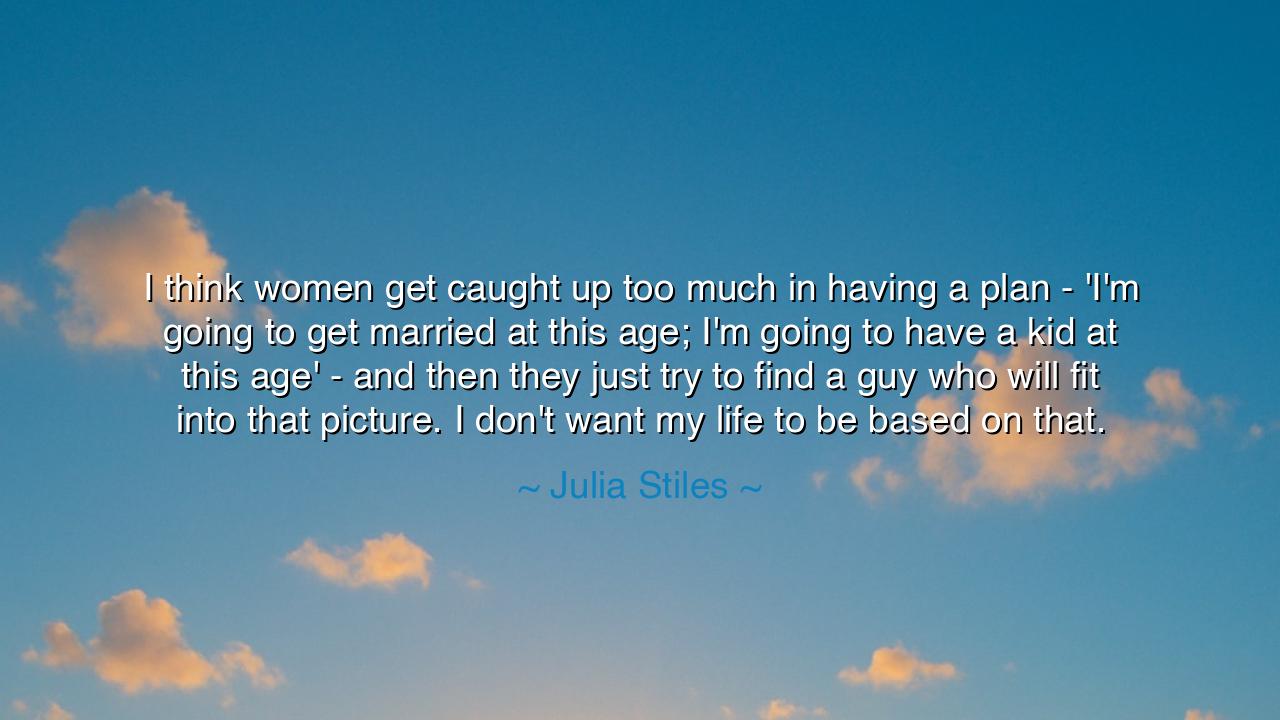
I think women get caught up too much in having a plan - 'I'm
I think women get caught up too much in having a plan - 'I'm going to get married at this age; I'm going to have a kid at this age' - and then they just try to find a guy who will fit into that picture. I don't want my life to be based on that.






The words of Julia Stiles, “I think women get caught up too much in having a plan—‘I’m going to get married at this age; I’m going to have a kid at this age’—and then they just try to find a guy who will fit into that picture. I don’t want my life to be based on that,” ring with the voice of rebellion against the chains of expectation. She speaks of the prison built not of stone, but of timelines, where the worth of a woman is measured against milestones imposed by custom rather than by the calling of her own soul.
The origin of such a struggle lies in centuries of tradition. For generations, women were taught that their highest duty was to marry and to bear children, and that their time upon this earth was marked not by dreams, but by deadlines. To be unmarried past a certain age was to invite whispers; to be childless was to be judged incomplete. Against this tide, Stiles raises her voice, declaring that a life must not be reduced to a schedule, nor love reduced to a role to be filled.
Consider the story of Elizabeth I of England, the Virgin Queen, who defied all the pressures of her age to marry. Suitors came and went, alliances were offered and refused, but she declared herself wedded to her kingdom. In breaking the mold, she claimed the right to shape her own destiny, ruling with strength and cunning unmatched. Her example shows that a woman’s worth is not bound to the plan of others, but to the vision she sets for herself.
Stiles’ words also reveal a warning: that when one clings too tightly to a plan, one may mistake companionship for a box to be checked rather than a soul to be cherished. To seek a guy only to fit a timetable is to reduce love to a transaction, stripping it of its wonder and power. True love, she implies, is not found by force or by schedule—it is encountered freely, in the unfolding rhythm of a life lived authentically.
The lesson is heroic in its simplicity: do not let your years be ruled by the dictates of others, nor your heart be bound by an artificial clock. Build a life that grows from within, not from pressure without. In doing so, love, if it comes, will come as a gift, not as a requirement, and children, if they arrive, will be welcomed into a story not of obligation, but of joy.
Let the generations remember: a plan may guide, but it must never enslave. The truest path is not written in calendars or carved into expectations—it is discovered in the courage to live freely, to choose boldly, and to love without fear. For the soul that claims its own destiny is the soul that shines with the fullest light.






DNDiep Ngoc
Julia Stiles’ quote makes me think about the tension between living authentically and dealing with societal expectations. It’s easy to get caught up in planning your life around milestones like marriage and children, but is it possible to achieve happiness and success without having everything mapped out? How do we know when it’s time to stop planning and start living? And can women embrace uncertainty without feeling the weight of judgment from others?
KNKien Nguyen
It’s interesting how Julia Stiles touches on the idea of not fitting your life into a pre-set plan. But doesn’t this quote also highlight how society expects women to marry and have children at a certain age? While it's empowering to think about breaking free from these expectations, I wonder if this shift in mindset could lead to feelings of being lost or directionless for some. Can women be truly fulfilled without some sense of a structured life plan, or is flexibility the key?
HHoang
Julia Stiles' perspective seems like a healthy approach to life, especially in a world that often puts pressure on women to conform to specific timelines for marriage and family. However, how do we balance being open to opportunities that may come our way while not getting too caught up in ‘waiting’ for the perfect partner to fit into our ideal life plan? Does this approach risk making us too passive in pursuing what we want out of life?
Ffantony
This quote really resonated with me because it challenges the norm that women should have everything planned out according to society’s expectations. But what happens when you don’t follow that path? Do we face judgment for choosing to live life more spontaneously and on our terms? It’s refreshing to hear someone like Julia Stiles reject the notion that women’s lives should be planned out like a checklist, but how do we deal with the pushback from others when we make unconventional choices?
NTtrn nhat thanh
I completely agree with Julia Stiles here. The idea of sticking to a rigid timeline can be stifling, especially when it comes to relationships. Instead of trying to fit a partner into a specific mold, shouldn’t we focus on building a relationship based on shared values and mutual respect? Is it possible to let go of these societal pressures and still lead a fulfilling life, or is there still a lot of stigma attached to not following the traditional path?